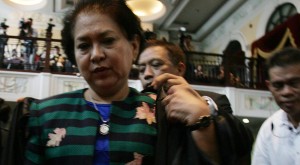MANILA, Philippines—The Commission on Audit (COA) had begun a “fraud audit” of the National Food Authority (NFA) even before the alleged rice smuggling controversy broke out.
At Thursday’s Senate hearing on the pork barrel scandal, COA chair Grace Pulido-Tan said the agency decided to conduct a fraud audit after uncovering “badges of fraud” while reviewing audit reports on the NFA for the past five to seven years.
“The initial assessment already points to a scheme that may be fraudulent,” she told the blue ribbon committee. “For example, there could be a possible payroll tabbing or ghost delivery.”
Tan said a fraud audit was a kind of a special audit focused on fraud.
The fraud audit was not prompted by the rice smuggling controversy, but the audit seemed to jibe with testimonies on rice smuggling at congressional inquiries, according to the COA chair.
“We picked up a lot of information, such as the big price differences in the price of importation by dummy cooperatives. Things like that,” she said.
Some 50,000 metric tons of rice were being smuggled into the country every week in 2013 but this was stopped in October when a new customs commissioner took over, according to the Bureau of Customs (BOC).
The Senate has opened an inquiry into the unabated smuggling of rice into the country.
The National Bureau of Investigation was looking into the possible links of David Bangayan, also known as “David Tan,” to rice smuggling.
At last week’s hearing, Justice Secretary Leila de Lima said Bangayan himself paid farmers’ cooperatives to bid for permits to import rice, offering incentives, and used the cooperatives as fronts to sell and distribute imported rice.
Bangayan insisted that he was neither David Tan nor was he involved in rice smuggling.
De Lima said two witnesses had come forward and executed affidavits detailing Bangayan’s modus operandi in the importation of rice using a network of farmers’ cooperatives.
The witnesses said David Bangayan and David Tan were the same.
One witness said Bangayan had recruited the cooperatives to take part in the bidding of rice importation allocations at the NFA.
Bangayan paid for the cooperatives’ license fees, bonds, document form fees as required by the NFA and the BOC, and shouldered airfare and accommodation expenses of the cooperatives’ representatives while preparing for the bidding, De Lima said.
The other most recent witness also detailed other forms of smuggling—rice shipments were declared as construction materials; an import permit was recycled if a shipment went through the BOC without the permit being stamped “consumed;” and an excess in rice shipment by the government went to warehouses of rice traders, De Lima said.
The justice secretary said that once the NBI has built an “airtight case,” it will file charges against certain people for preliminary investigation.
